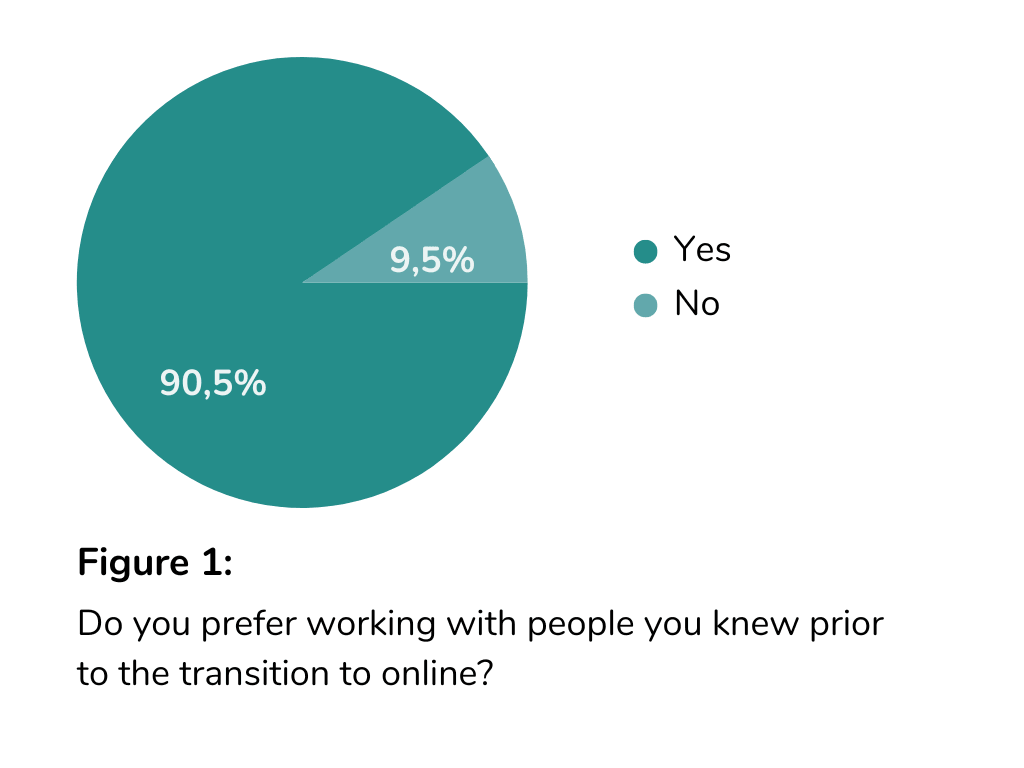Sue, a data analyst, switched jobs just a few weeks before the pandemic hit. Her first day with her new employer played out online, as has every day since. With the ongoing lockdowns, her new employers took the decision to move to a 100% virtual working environment. According to Sue, while “flexibility and work-life balance are amazing”, there is one missing ingredient – “the level of comradery, it’s just not the same”.
Despite the many benefits of online working, employee satisfaction levels have slumped when compared to pre-covid times. Surveys of virtually-based employees detail a lack of human connection; people miss the informal – over the water cooler – conversations or ‘after work drinks’ that reinforce professional relationships. It seems that online ‘virtual coffee’ sessions are not a substitute for face-to-face interaction. This drop in satisfaction levels – whether perceived or real – is important. How employees think about their connections with colleagues underpins the trust systems of everyday working, such as providing support and advice amongst peers or lending a hand to a colleague in need.
A team of undergraduate students from the UNSW Career Accelerator unit set out to help people like Sue. These students found that employee referral programs – being a trust-based approach to recruitment – present a solution to improving employee satisfaction. With a referral, employees are incentivised to help recruiters target people they already know. This prior knowledge of how people work increases trust between employees and, as such, improves employee satisfaction.
Course Overview
Students from COMM2244 Adaptive futures – a UNSW work-integrated learning program for undergraduates – explored employee satisfaction by comparing face to face with remote working environments. The project was conducted in partnership with Firstbird, a global employee referral program provider for enterprises. Over eight weeks, students completed workshops in consulting skills, problem solving skills and the art of convincing. In parallel with these workshops, the student team gathered and analysed data from interviews – questions included the challenges of remote working, how it differed from face to face, and how the switch affected work relationships. Comparing their emerging understandings with research findings, the students provided fresh insights into the problem of employee satisfaction.

Why Employee Satisfaction Has Dropped
Three themes from the student’s data set emerged that explained the drop in employee satisfaction during online working: (1) difficulties in maintaining connections, (2) difficulties in establishing friendships and (3) the lack of casual conversation. As an example, one interviewee stated, “it’s easier to maintain connections [through face-to-face] as most of our colleagues are in the same room.” Another commented, “casual conversation can happen anywhere in the office, whether it be in the break room, or simply walking across the office to their desk, online conversations require coordinating schedules.”
One of the student researchers, Michael Kong (final year Master of Commerce), summed up the situation: “It’s clear from our responses, there is a strong relationship between familiarity and employee satisfaction, as the weak culture created through remote working has had a negative effect on productivity and satisfaction”.
How Familiarity Builds Trust
Like Sue, new hires tend to find difficulty assimilating into the new company because they lack a pre-established baseline of trust. Without trust, employees must rely on systems and processes to influence how they work together. As the world-renowned expert on trust, Francis Fukuyama, explains “people who do not trust one another will end up cooperating only under a system of formal rules and regulations, which have to be negotiated, agreed to, litigated, and enforced, sometimes by coercive means.”
Creating a trusting relationship between colleagues is essential to employees performing at their best, because they become more comfortable asking questions and taking on feedback, and overall engagement rises. With this context, unsurprisingly, the students identified an overwhelming (90%) of employees prefer to work with people they already knew face to face, as opposed to people they know only through remote working.

How Referral-Based Recruitment Programs Help
Most interviewees stated they would feel more comfortable knowing someone at their new job prior to starting. As one explained, “If you know someone at a party you’re attending, you’d be more inclined to stay longer at the party as opposed to knowing no one. Like working in a new environment, it would make me feel more comfortable as a new starter [if I knew someone].” Another employee – who had been hired via a referral – explained how this same familiarity is important in the workplace: “(It’s) definitely easier, it’s not as awkward asking for help, it’s easier to communicate with people I’m familiar with, because they are familiar with what I need.” By cultivating a work culture with familiarity, individuals feel more comfortable opening up and sharing, leading to an increase in productivity.
Referral based requirement adopts a familiarity approach. First, ambassadors reach out to the people they already know to initiate conversations with potential candidates. Then potential candidates are introduced to their new team. This approach is personal and, for the potential new hire, built on familiarity – their conversation is with someone they already know, and they know they will be working with that same person.
This approach to recruitment is already known for significantly better retention rates, lower hiring costs and faster onboarding (see Figure 2 below). What these students have found is that improving trust and, as such, employee satisfaction can be added to these lists of benefits.

Guest post by Bradley Hastings – Research Insights Associate, UNSW Insights Unit





















